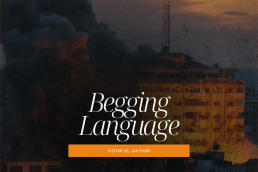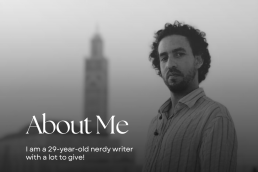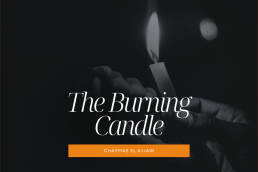The station is fussy. People are coming, going, embracing, crying, and looking at their tickets repeatedly. Yet, the people in the station of Boujloud are not the same and are definitely not equal. There are two kinds of people in the station: “Wlad Lmahata,” or the sons of the station, and the travelers. The travelers’ pockets and wallets are hunted down because for Wlad Lmahata to fight over a dirham is nothing new. These fights are daily, and, at times, they can also be bloody. The veins in their forehead strain against their skulls as their eyes bulge at the sight of dirhams. Some continue to rub their hands against each other, appealing to the heavens for good fortune. However, they look like flies attempting to clean their filth while living in filth; they fail forever. If a son gets a fat tip, he rewards himself with a pack of Marlboro cigarettes and a pack of Flash chewing gum. Sometimes, they call for a ragged, exhausted hollow cup of mint tea. This holy trinity is invoked once a day, for it is a luxury. As the lips slightly caress the hips of the cigarette, the tea overwhelms the smoke with fluid hugs. The tongue becomes an oriental dancer amidst the sexual tension between tea, smoke, lips, and cigarettes. The cigarette burns itself, for it knows it has sinned until it is thrown under cold, emotionless boots. The Flash chewing gum cleanses the traces of sin, the remnants of unending sexual intercourse. As soon as the Flash chewing gum is spat, the eyes bulge, the veins tense, the sweat awakens, and poverty looms.
The sons do not call each other by their real names. It is near disgrace if one does so. This unwritten and unspoken law is unknown to outsiders. They all have nicknames that refer to their body shapes, past inconveniences, mispronounced words, etc. The moniker might be disrespectful, but it is a badge of honor since only the sons can have it. The rite of passage to manhood in the station depends on bestowing a name on the unnamed. Yet, one has to undergo a trial of trickery, wiliness, and slyness. The unnamed has to hustle 20 dirhams from a single traveler through lies, deceit, or theft. The means matter not; the end does. The unnamed fingers hiss, awaiting the right moment to strike a pocket or a wallet. The Index acts as a side-kick to the middle finger, the anaconda, as it strikes a clueless pocket. Even when the hunting fingers are seen, the other fingers speak not; instead, they grin at each other. The traveler can only be bitten; if they scream, “A THIEF!” the other fingers shall become fists to seal the screaming mouth. None shall interfere in the trials. If the unnamed pass this trial, a name is bestowed upon him.
“Sninat” is a tall and slender son of the station. He is nicknamed Sninat, or teeth because he does not have them. His trial was pretty easy because of his long and slippery fingers; he got his 20 dirhams on the first try from a bourgeois merchant. He wore his usual worn-off FC Barcelona t-shirt without a number on the back, while his no-longer-black jeans had a small imperishable patch on the left side of his ass. Sninat lurked with a cigarette in his hand. Then, his eyes surveyed the field before him, awaiting a lost traveler. When his eyes detected his prey, he jogged towards a fat, soft, and clear-skinned traveler and said the line that all the sons say, “To which city are you going, brother?” You could sense the jealous stares of the other sons on Sninat’s back, shredding the already exhausted t-shirt. Whether the traveler answered did not matter, Sninat smiled and pulled the luggage off the traveler’s hands ‘to help.’ Then he walked with him. The Grand bus Al-Farasha, or the butterfly, in which the traveler was leaving for Tangiers, was ready to depart. Sninat pointed at it, and the traveler nodded.
Upon reaching Al-Farasha, the traveler gave Sninat a wicked smile, put his hand in his pockets, pulled out some change, picked 2 dirhams, and handed it over. Sninat felt insulted and glared at the traveler, then shouted, “Add 5 dirhams at least!” Suddenly, the traveler felt the chill of the gazes around him. The gazes of jealousy shifted to the traveler and became of hatred. The cold sweat on the fat traveler’s forehead and red cheeks made him look an easy prey. The traveler put his hand in his pockets, pulled 10 dirhams, and extended his hand. Sninat took it violently from him and said, “You should have led with this, my brother!” He returned triumphantly to his favorite corner in the station beside “Mol Detai,” the cigarette seller, and “Mol Zariaa,” the sunflower seeds seller. He bought two Marlboro cigarettes, two Flash chewing gum, and a cup of mint tea before sitting in his corner, silent and alone. As he inhaled and exhaled the cigarette’s smoke, he thought about his wife and son as he often does. He still lives with them in a 10×8-meter room which functions as a living room, a bathroom, a kitchen, and a bedroom. He pays 450 dirhams for this tiny darkroom. No one attended their wedding except for their parents and close relatives. They played a few Chaabi songs on an exhausted MP3 player while no one danced. It ended fast, he thought. His wedding day should have taken the whole night. He had wanted a DJ to make the entire neighborhood insomnolent. He knew he could not afford these things but always dreamed about what could have been.
Each day in the same corner, the first cigarette ends while its smoke becomes dense. He lights the second cigarette while gazing if any new traveler appears. No one does. He returns to his imagination and recollections. Sninat remembers how his wife had made his life easier when they had just gotten married. She would wear cheap panties and light robes for him. Although she had only one breast, he was happy with her body. He saw her as the materialization of beauty. When she got pregnant, she became shrewish and, at times, too demanding; she denied him sex. Sninat thought it was all due to pregnancy, yet it was not. After his son was born, she started nagging him for sugar, food, diapers, and much more. He could not afford everything. “She dismissed me for six years from her body, yet she still demands money!” he thought and slightly grinned. He fought over 5 dirhams regularly just to have something to give to his wife at the end of the day. She became everything he did not want her to be. His son, Yahya, should be in elementary school this year. Sninat remembers how he pretended to have forgotten the deadline for students’ inscription just to save money for rent. He lied, but it was for everyone’s sake. He often tells Mol Detai, “If it were not for these cigarettes, I would have killed myself!” Mol Detai responds with a smile as if he already knows, as though every son of the station is the same. He is always afraid of ending his second cigarette, but alas, the second cigarette ends. The dense smoke in his chest hides a heavier celestial presence.
One day, per usual, Sninat noticed a traveler in the station. She was walking nonchalantly while talking about her undergraduate research on the phone in English; she was arguing for the reduced poverty rates in Morocco while the voice from the phone was arguing that alienation is a Moroccan myth. Sninat’s eyes bulged as he walked silently toward her. Sninat and another son stood beside the traveler simultaneously; both asked her almost simultaneously, “To which city are you going, sister?” She said Rabat. Both walked with her. Sninat carried her luggage while the other chatted with her as he was chewing a Flash chewing gum fast and hard. When the traveler arrived at the Grand bus, she gave the other son 10 dirhams. She entered the bus, still talking about her dumb supervisor, who did not see the genius in her. The voice agrees, and both of them giggle. Meanwhile, in a dark corner next to Mol Detai, Sninat was furious and demanded 5 dirhams. The other son, Lhafi, made it clear that he did not want to share. They fought over 10 dirhams. Sninat was winning the fight until his adversary pulled a kitchen knife. Lhafi knifed Sninat. As Sninat was dying slowly, he thought of his wife, his son, his dream of owning a house, the station, and even having sex. He realized he was not the station’s son but a living dead, a son of poverty. Poverty loves its children to death. Sninat died for 10 dirhams. 6 hours after his death, an ambulance “unintentionally” arrived late. Lhafi ran. He, again, became unnamed. Al-Farasha departs.
Rachid Benharrousse
Afanine
مجلة أفانين: هي منصّة إلكترونيّة حرّة، وشاملة، ومتنوّعة، تديرها جمعيّة كتّاب الزيتون والمعهد اللغوي الأمريكي بالدار البيضاء، وتضع على عاتِقها أن تفتحَ نافذةً، للكتّاب والفنّانين في المغرب، نحو آفاق الإبداع. تنشر المجلة أعمالًا أدبية وفنية للكتاب والفنانين الشّباب بالمغرب، بالإضافة إلى مقابلات، وبروفيلات، وفرص، وصور فوتغرافية، وغير ذلك. تروم المجلة تسليط الضّوء على إبداعات الكتاب والفنانين الصّاعدين بالمغرب.





